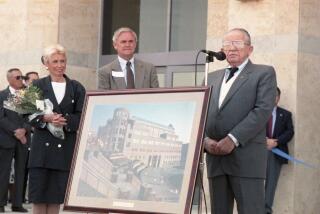University Honors Suffragette Despite Racism Charge
- Share via
AMES, Iowa — Carrie Chapman Catt, a crusader for women’s suffrage and founder of the League of Women Voters, had the right feminist credentials for Iowa State University to name a building after her.
Her views on race are another matter.
Now the university is under pressure to reconsider its decision to honor Catt, an Iowa State graduate who died in 1947 at age 88.
The debate focuses on a statement Catt made in a losing effort to win ratification in two Southern states of the amendment giving women the vote: “White supremacy will be strengthened, not weakened, by women’s suffrage.”
Catt’s supporters say she was a product of her times who made the statement simply to win Southern support.
But students and others say the school cannot shove aside Catt’s remark and others like it. Catt also spoke of prohibiting voting by uneducated immigrants and referred to Indians as savages.
“A product of her times? I cringe every time I hear that remark,” said Meron Wondwosen, a black sophomore from Silver Spring, Md. “People treating people with dignity is not something that is bound by time. It’s a basic principle.”
It was Catt who envisioned the state-by-state strategy to build momentum for the woman’s suffrage amendment that was ratified in 1920. She also founded the League of Women Voters.
Neither Iowa nor the university had done much over the years to honor the school’s most famous woman graduate. Previous efforts to name buildings for her were laughed off by those who didn’t want a “Catt house.”
Last fall, on the 75th anniversary of the ratification of the 19th Amendment, the university relented. Old Botany was renovated and renamed Carrie Chapman Catt Hall. It houses the College of Liberal Arts and Sciences.
Catt’s controversial remarks were no secret when the university renamed the building. In fact, the school held a seminar on Catt’s life and views.
Martin Jischke, the university president, said the school has no plans to change the building’s name. He noted Catt’s support for the League of Nations in the early 1920s, and later, for the United Nations.
“While I don’t support everything that Carrie Chapman Catt did or said, I believe her contribution to women’s suffrage and world peace are worthy of the recognition that the university has given her,” Jischke said.
Women in the Iowa Legislature agreed: 26 of 27 signed a letter supporting Catt. But the Ames chapter of the NAACP took the other view.
“The university needs to publicly acknowledge that sometimes good people can do bad things,” said chapter president George Jackson. He said the university must change the name so that it can say, “I will not tolerate racism in any form or fashion.”
The debate over Catt’s legacy has both sides poring through thousands of her speeches, trying to find passages to strengthen their position.
Jane Cox, a theater professor who wrote and performs a one-act play on Catt’s life, said Catt rejected racism both before and after the controversial statement.
“That was a speech she made in 1919 in Mississippi and also in South Carolina,” Cox said. “I view this as one of the ways she used to try to persuade white Southern men. It was a waste of time, of course. Neither of those states voted for it.”
But Wondwosen, one of 660 blacks on the campus of 24,000 students, said Catt didn’t work for change, either.
“Women of color couldn’t vote in the South until 1964,” Wondwosen said. “So I would say if she were still alive, ‘What did you do after 1920 to guarantee that women of color could vote?’ She didn’t do anything.”
Dan Mangan, the student government president, comes down on the side of Catt’s supporters, calling the charges of racism “moral absolutism.”
“People are trying to judge a person’s entire contribution to society by focusing on a few narrow actions or words,” Mangan said. “By the same reasoning, we’d tear down the Jefferson Memorial because he owned slaves.”
More to Read
Sign up for Essential California
The most important California stories and recommendations in your inbox every morning.
You may occasionally receive promotional content from the Los Angeles Times.












